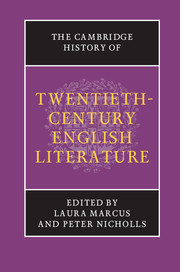Book contents
- Frontmatter
- Introduction
- PART ONE WRITING MODERNITY
- PART TWO THE EMERGING AVANT-GARDE
- PART THREE MODERNISM AND ITS AFTERMATH, 1918–1945
- 10 Trauma and war memory
- 11 The time–mind of the twenties
- 12 Modern life: fiction and satire
- 13 Modernist poetry and poetics
- 14 Modernity and myth
- 15 Psychoanalysis and literature
- 16 Biography and autobiography
- 17 ‘Speed, violence, women, America’: popular fictions
- 18 Theatre and drama between the wars
- 19 Literature and cinema
- 20 The thirties: politics, authority, perspective
- 21 Literary criticism and cultural politics
- 22 Surrealism in England
- 23 World War II: contested Europe
- 24 World War II: the city in ruins
- PART FOUR POST-WAR CULTURES, 1945–1970
- PART FIVE TOWARDS THE MILLENNIUM, 1970–2000
- Bibliography
- Index
- References
19 - Literature and cinema
from PART THREE - MODERNISM AND ITS AFTERMATH, 1918–1945
Published online by Cambridge University Press: 28 March 2008
- Frontmatter
- Introduction
- PART ONE WRITING MODERNITY
- PART TWO THE EMERGING AVANT-GARDE
- PART THREE MODERNISM AND ITS AFTERMATH, 1918–1945
- 10 Trauma and war memory
- 11 The time–mind of the twenties
- 12 Modern life: fiction and satire
- 13 Modernist poetry and poetics
- 14 Modernity and myth
- 15 Psychoanalysis and literature
- 16 Biography and autobiography
- 17 ‘Speed, violence, women, America’: popular fictions
- 18 Theatre and drama between the wars
- 19 Literature and cinema
- 20 The thirties: politics, authority, perspective
- 21 Literary criticism and cultural politics
- 22 Surrealism in England
- 23 World War II: contested Europe
- 24 World War II: the city in ruins
- PART FOUR POST-WAR CULTURES, 1945–1970
- PART FIVE TOWARDS THE MILLENNIUM, 1970–2000
- Bibliography
- Index
- References
Summary
The impact of cinema on early twentieth-century literary and, more broadly, cultural consciousness has, until recently, been neglected. Yet to look back at the period is to find that film consciousness was everywhere. In 1928, Kenneth Macpherson, co-editor of the avant-garde film journal Close Up, wrote: ‘The cinema has become so much a habit of thought and word and deed as to make it impossible to visualize modern consciousness without it.’ In the same year, the poet H. D. (Hilda Doolittle), a fellow contributor to Close Up, claimed that ‘the world of the film today […] is no longer the world of the film, it is the world […] There has never been, perhaps since the days of the Italian Renaissance, so great a “stirring” in the mind and soul of the world consciousness.’ She was writing here about ‘Russian Films’, but the promise of cinema was its internationalism, its creation of a visual language that transcended cultural and linguistic differences, and that, for H. D. as for many other early film enthusiasts, did not survive the transition to sound in the late 19205 and early 30s.
George Bernard Shaw also saw the birth of film as a cultural revolution. ‘The cinema’, he wrote in 1914,
is a much more momentous invention than printing was… The cinema tells its story to the illiterate as well as to the literate; and it keeps its victim (if you like to call him so) not only awake but fascinated as if by a serpent’s eye. And that is why the cinema is going to produce effects that all the cheap books in the world could never produce.
- Type
- Chapter
- Information
- The Cambridge History of Twentieth-Century English Literature , pp. 335 - 358Publisher: Cambridge University PressPrint publication year: 2005

